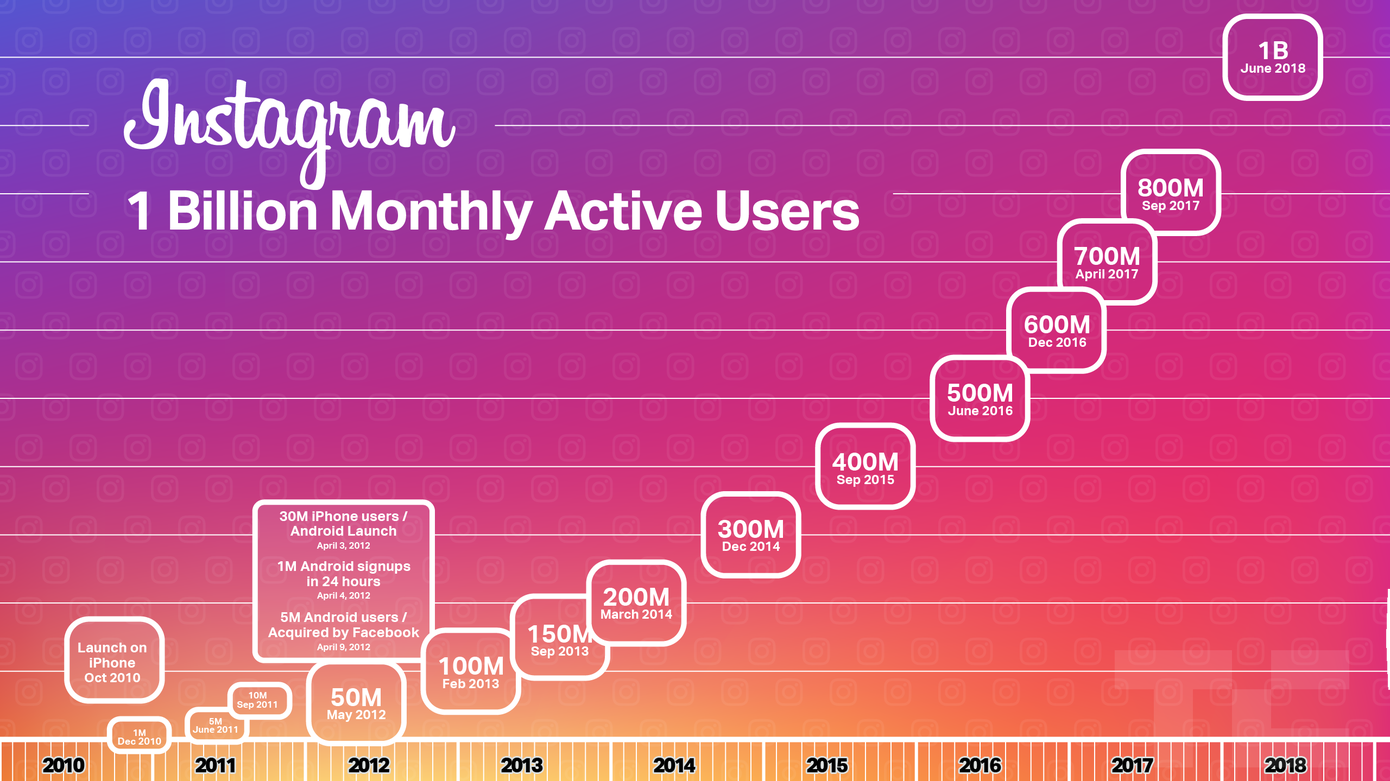Why would B2B brands be interested in using Instagram Stories as a marketing channel?
It starts with a very simple premise: B2B customers are people, and people use Instagram, which eclipsed 1 billion active monthly users over the summer. And when it comes to the platform’s “Stories” format, it surpassed the similarly oriented Snapchat in users within a year of its 2016 launch.

Of course, the issue here is more one of context. Can business-focused content really succeed on a social network that slants so strongly toward casual, leisure surfing?
As we’ll see, B2B companies are showing that yes, it can. And there’s plenty of opportunity to take it a step further.
Businesses Are Taking Interest in Instagram Stories
As Digiday noted last month, the popularity and versatile functionality of Instagram Stories have prompted advertisers to shift more of their ad spend to the platform. In the same piece, we learn that completion rates for Instagram Stories are on the rise, and younger age groups have been gravitating toward them.
With these insights in mind, it’s easy to see why Instagram Stories are attracting a larger share of commercial consciousness.
There’s also one feature in particular that makes this format appealing for marketers, even compared to standard Instagram advertising:
The ability to integrate links and calls to action.
Typically, Instagram only allows you to include an external hyperlink in your user bio. But with Stories, you can drop a CTA into each individual piece of content. For B2B brands, which are often more focused on measurable marketing outcomes than their B2C counterparts, this is huge.
“This turns each piece of content into its own referral opportunity, and it allows connected pieces of content to be organized into a living content funnel,” writes Jonathan Crowl at the Content Standard. “While the experience of watching multiple pieces of connected content can function as a content funnel, qualifying users and leading them toward a conversion, each individual piece of content can potentially serve as its own CTA, leading users to a corresponding external destination relevant to their position in the content funnel.”
Reports suggest that links in Instagram Stories were generating “swipe-through rates” of 15%-25% within a month of the functionality being rolled out.
Why Instagram Stories Are Gaining B2B Buzz
In his aforementioned article, Crowl cites examples of IBM leveraging Instagram Stories for thought leadership, and MailChimp using it to showcase company culture. These are mainstays for B2B content marketing, and Instagram is well suited for them as a platform.
“Stories is the one place where brands are able to actually give people a peek behind the curtain in terms of who they are and what they’re all about,” said Instagram’s Morgan Cornelius in a recent interview with Fast Company. “This allows them to establish authenticity with their customers.”
As we frequently emphasize here on the TopRank Blog, authenticity is a critical differentiator for B2B brands, albeit a difficult one to nail down.
The other big advantage of Instagram Stories lies in serialized storytelling. This style of content delivery can drive much greater engagement and build trust with storytelling — both top B2B priorities.
Clever use of narrative in combination with the CTA functionality enables marketers to “create a mini-funnel to drive viewers toward a conversion,” suggests Nina Zoukelman of Oktopost, pointing to a campaign where Cisco strung together interactive visual insights from its Annual Cybersecurity Report before inviting viewers to click and download the PDF:
The other big advantage of #InstagramStories lies in serialized #storytelling. - @NickNelsonMN Click To Tweet
Why Many B2B Brands Remain Reluctant
As we alluded earlier, there are some lingering hold-ups when it comes to using Instagram for B2B marketing. One is the mindset and demographics of its users, who tend to skew younger and more casual.
There’s also the makeup of Instagram’s content, which is primarily visual. This often works well for B2C companies marketing products, but not necessarily as well for B2B companies marketing solutions or services.
The Instagram Stories format itself has some drawbacks as well. For instance, Digiday points out that these are not great for increasing your overall footprint on the platform: “Posts that aren’t Instagram Stories generate three times more reach on average compared to those that are.” This is offset by the highly engaging nature of this content, but if you don’t have much of a following on the ‘Gram yet, your brand may not find a ton of value in this approach.
The Untapped B2B Opportunity in Instagram Stories
According to annual benchmarking research from Content Marketing Institute and MarketingProfs, Instagram adoption hasn’t increased all that much for B2B. In 2015 the percentage checked in at 24%, and here in 2018 it’s only up to 30%.
So clearly, despite its dramatic user base growth, Instagram still hasn’t caught on with the B2B marketing community at large, in part because of the downsides mentioned above.
While Instagram may always be a more B2C-friendly social channel, I have little doubt that it’s going to start gaining more B2B traction, with the business-friendly nature of Instagram Stories helping foster this growth. And since advertisers are still finding their way with Instagram Stories, the cost of placing ads within them remains relatively low compared to the main mobile feed format.
Creative and ambitious B2B marketers can get ahead of the curve by using this feature to:
- Showcase thought leadership and behind-the-scenes company culture
- Increase authenticity with audiences
- Create content funnels leading to strategic CTAs
- Craft compelling serialized stories that engage and inspire
Much like Facebook Stories, Instagram Stories offer a nascent playground for B2B marketing. If you’re looking to experiment with new channels as you peer ahead to 2019, these both stand out as great opportunities.
To learn more about the current social media marketing landscape from a B2B-centric perspective, check out these other posts from the TopRank Marketing Blog:
- How 5 B2B Brands Are Using Snapchat and Instagram Stories
- 5 Key Trends & Takeaways from Social Media Examiner’s 2018 Report
- Social Media Marketing Benchmarks: What Works & Where to Focus
- The Power of Social Media Polls: The Drill-Down on 3 Platforms + 5 General Best Practices


